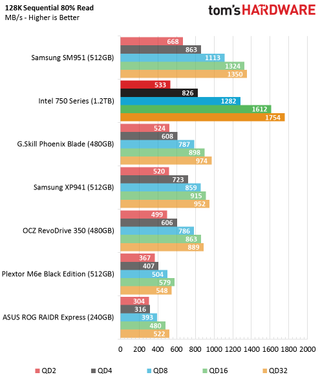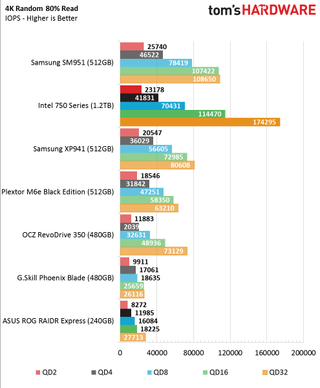Intel 750 Series 1.2TB NVMe PCIe SSD Review
Intel is still playing by the 2014 playbook, re-purposing datacenter technology to fit your desktop and budget. This time, the company is reaching for its top-shelf controller technology to guarantee a winner.
Why you can trust Tom's Hardware
Mixed Workload And Steady State Testing
Our mixed workload testing is described in detail here, and our steady state tests are described here.

Our sequential mixed workload test with a single worker pushes Intel's 750 Series to over 500 MB/s at a queue depth of two. The drive skips along in predictable increments as we increase the workload's intensity. By QD8 (a valid measuring point for multitasking environments), it steps away from Samsung's SM951, showing this product's datacenter pedigree.

In our random 4KB mixed test, the 750 Series needs an even more demanding workload to distinguish itself from the SM951. With 16 outstanding commands, you push a lot of data to and from the drive, and this workload only comes from professional software environments working with several files at once.
Sequential Steady State Performance


The steady state mixed workload test put the 750 Series behind OCZ's RevoDrive 480GB based on SandForce SF-2281 controllers. That particular processor fares really well in this environment, and the RevoDrive 350 uses four controllers in RAID 0. The 750 Series still tops all other single- and dual-controller products on the market today.
Random Write Steady State Performance


The enterprise lineage really shows in our steady state 100% random 4KB write test. In time, we hope to see a RAID 0 NVMe boot environment that would give this test a little more meaning. Still, the random write results not only represent best-in-class performance, but also the highest consistency.
Current page: Mixed Workload And Steady State Testing
Prev Page Four-Corner Performance Testing Next Page PCMark 8 Real-World And Advanced Software PerformanceStay on the Cutting Edge
Join the experts who read Tom's Hardware for the inside track on enthusiast PC tech news — and have for over 25 years. We'll send breaking news and in-depth reviews of CPUs, GPUs, AI, maker hardware and more straight to your inbox.
-
mapesdhs Typo on the 1st page, it states, "Up To 22400 MB/s" for sequential read.Reply
Presumably that's supposed to be 2400. ;)
Ian.
PS. Would be handy to include just one good normal SATA SSD as
a comparison reference, eg. 850 Pro 512GB.
-
CRamseyer Thanks Ian, we'll get the typo fixed ASAP.Reply
Let me see what I can do about putting a 2.5" performance drive in the charts. I'm building new charts now for PCIe-based devices.
Looks for the other SM951 capacity sizes and Predator soon. -
tridon ReplyPS. Would be handy to include just one good normal SATA SSD as
a comparison reference, eg. 850 Pro 512GB.
For those of us that don't have these number in our heads, I get no real sense of how fast this really is compared to my ssd. -
unityole from what I see, intel with lower performance number is likely due to lower performance controller or flash or firmware, whichever it maybe we all know samsung like to clock controller/flash higher for better looking performance. reason that random write at QD1 is so fast probably because of NVMe. can't wait to see this go up against SM951 NVMe.Reply -
unityole ReplyFor those of us that don't have these number in our heads, I get no real sense of how fast this really is compared to my ssd.
from HDD to SSD you see the huge latency drop by about 50x, where as fastest SSD compare to ram is maybe 30-50x dependent on ram/ssd. with NVMe can look forward to at least another 3x loss in latency.
basically it'll be so much more snappier than your ssd for sure. -
AndrewJacksonZA Does this quote from page 5 apply to this card: "In time, we hope to see a RAID 0 NVMe boot environment that would give this test a little more meaning."Reply
Is this card bootable in Windows 10 or not? -
CRamseyer I haven't tested it in Win 10 yet but I don't see MS going backwards with NVMe and not allowing it to boot.Reply
-
ralanahm Hi thank you for the article. If you ever reviewed a Mushkin scorpion deluxe could it be added to the chart? it has 2000 MB/s. the top one is a four 480-ssd raid on a card.Reply
http://poweredbymushkin.com/catalog/36-scorpion-deluxe-pcie-ssd
-
Arabian Knight NVMe Samsung SM951 is coming soon . and I think it will outperform this card ;) ..Reply
-
atheus Maybe it's just me (I doubt it) — when I see an article on something like this the biggest question on my mind is what exactly am I going to get from going with something like this for a system build rather than 2.5" SATA SSD at less than half the price. In order to understand that, I've got to go dig out another article with 2.5" SSD stats and compare them there. Please consider putting the most prevalent main drive option of today into the charts next time you pop out a NVMe article.Reply
